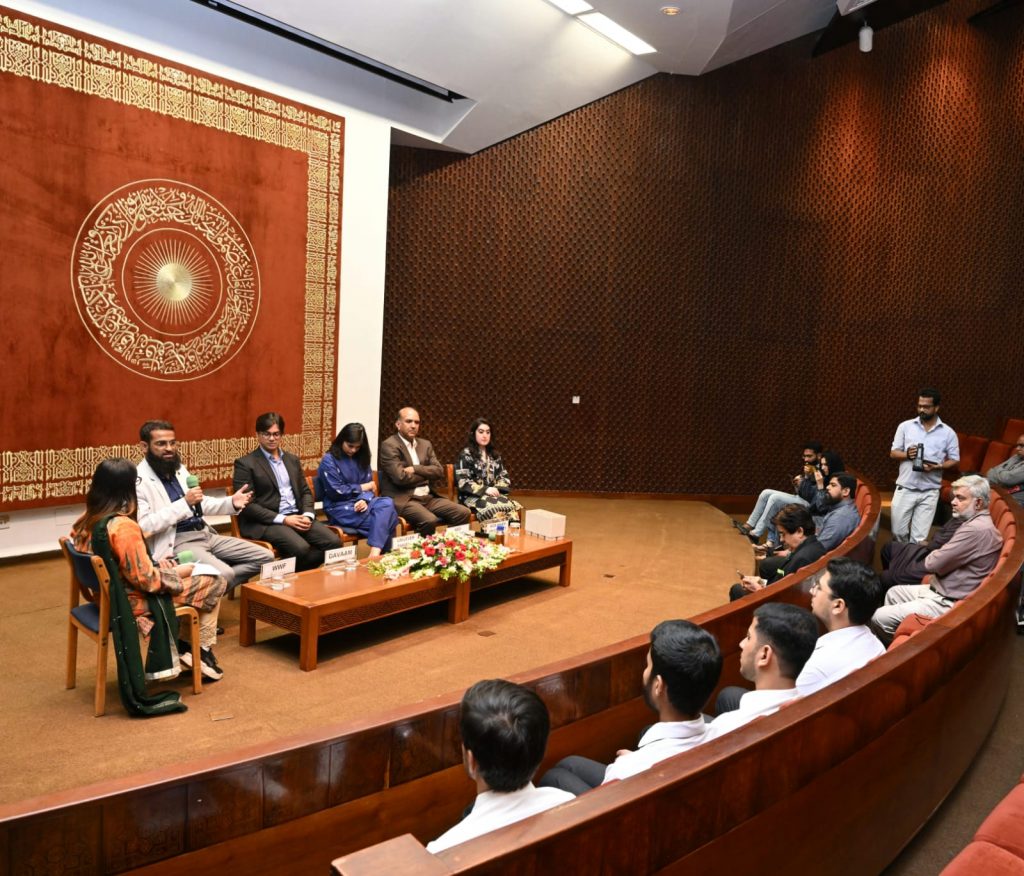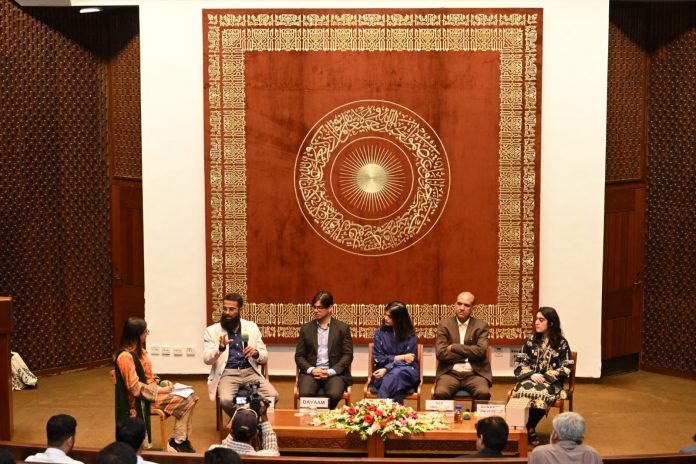Pakistan (Muhammad Yasir)
The Aga Khan University commemorated the 2023 World Environment Day, featuring the screening of documentary, “Oceans: The Mystery of the Missing Plastic” followed by a panel discussion at the AKU auditorium.
The panel discussion revolving around the topic of “Addressing plastic pollution through innovative and local solutions”, brought together experts from various fields to explore effective strategies to tackle the plastic crisis of global proportions. The panel included Mr. Ghazi Salahuddin, Regional Head (Sindh and Balochistan) at WWF Pakistan, Ms. Ramlah Tariq, Sustainability Lead at Unilever Pakistan, Mr. Salman Tariq, CEO at Davaam, Dr. Mehmood Ali, Associate Professor, Department of Environmental Engineering at NED University, and Ms. Amber Ajani, Manager Environment and Sustainability at the Aga Khan University.
The documentary showcased at the event raised awareness on how our addiction to plastic ends up polluting the deep sea, coral reefs, and other land and marine deposits, and eventually finds its way into our food chain.
Celebrated every year on the 5th of June, World Environment Day is a global commemoration to raise awareness on environmental challenges such as air pollution, plastic pollution, illegal wildlife trade, climate change, among others. Our event primarily focused on solutions to plastic pollution under this year’s theme of #BeatPlasticPollution.
As we know, the plastic waste is choking our seas and coasts, threatening ecosystems, livelihoods, and lives around the world. According to the United Nations Environment Programme, more than 400 million tonnes of plastic is produced globally every year, half of which is designed to be used only once. Of that, less than 10 per cent is recycled. An estimated 19-23 million tonnes end up in the lakes, rivers, and seas. Not only that, what is less known is that plastic broken down into microplastics which eventually find their way into the food we eat, the water we drink, and even the air we breathe. Moreover, many plastic products contain hazardous additives which pose a threat to public health.
In his welcome address, Mr. Jamil Ahmed Khan, Senior Advisor in the Office of the President at AKU said, “Plastic pollution is one of the most pressing challenges our world faces today. I appreciate the AKU’s Environment and Sustainability team for bringing awareness to the issue. AKU, along with the other agencies of the Aga Khan Development Network, has committed to net zero emissions by 2030 aligned with the latest climate science.”
During the panel discussion, Mr. Ghazi Salahuddin (WWF Pakistan) said, “Our world is swimming in plastic. Coastal communities residing along the Indus Delta are facing harrowing effects of plastic pollution. Our corporate sector has the central responsibility to incorporate sustainable production and disposal practices and root out those that harm our environment.”
Mr. Salman Tariq (Davaam) added, “Around 3.3 million tonnes of plastic is wasted every year in Pakistan which equals two times the size of Mount K2. It is important to financially incentivize circularity for people so they can be motivated to adopt the plastic-free lifestyle change needed for environmental conservation.”
Representing Unilever Pakistan, Ms. Ramlah Tariq said, “Our mantra is reduce, reuse, and recycle. We are committed to and working towards halving our use of virgin plastic by 2025.” She emphasized on having a multistakeholder model where civil society, corporations, and the government can all work together.
Dr. Mehmood said, “At NED University, we are actively working on producing research that can provide practical measures for conserving our environment. Our academia has a critical role to play in creating awareness, research, and solutions for addressing Pakistan’s environment problems.”
Ms Amber Ajani (AKU) shared, “Globally, AKU has made concerted efforts to phase-down single-use plastic water bottles and is now replacing plastic cutlery used for takeaway with natural birchwood cutlery. There’s an urgent need to reduce plastic use at the source and to become mindful of our responsibilities towards our planet.”
AKU recognizes its impact on the environment and its responsibility and is taking steps across its campuses to address the pollution and climate crises. Its efforts are guided by the AKDN-wide Environment and Climate Commitment Statement which is based on four principles: responsible stewardship, improving quality of life for the most vulnerable, socially responsible leadership, and leading by example through the net zero goal.
A similar event was organized at the Aga Khan University, Kenya campus which inspired conversations around plastic pollution and the need to take collective responsibility to combat this global challenge.







